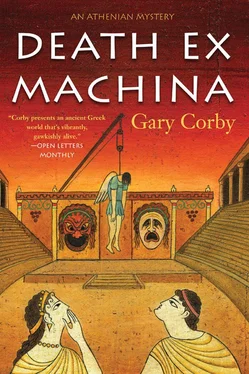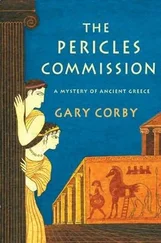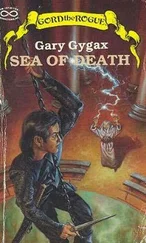Gary Corby - Death Ex Machina
Здесь есть возможность читать онлайн «Gary Corby - Death Ex Machina» весь текст электронной книги совершенно бесплатно (целиком полную версию без сокращений). В некоторых случаях можно слушать аудио, скачать через торрент в формате fb2 и присутствует краткое содержание. Год выпуска: 2015, ISBN: 2015, Издательство: Soho Press, Жанр: Исторический детектив, на английском языке. Описание произведения, (предисловие) а так же отзывы посетителей доступны на портале библиотеки ЛибКат.
- Название:Death Ex Machina
- Автор:
- Издательство:Soho Press
- Жанр:
- Год:2015
- ISBN:978-1-61695-520-5
- Рейтинг книги:3 / 5. Голосов: 1
-
Избранное:Добавить в избранное
- Отзывы:
-
Ваша оценка:
- 60
- 1
- 2
- 3
- 4
- 5
Death Ex Machina: краткое содержание, описание и аннотация
Предлагаем к чтению аннотацию, описание, краткое содержание или предисловие (зависит от того, что написал сам автор книги «Death Ex Machina»). Если вы не нашли необходимую информацию о книге — напишите в комментариях, мы постараемся отыскать её.
Death Ex Machina — читать онлайн бесплатно полную книгу (весь текст) целиком
Ниже представлен текст книги, разбитый по страницам. Система сохранения места последней прочитанной страницы, позволяет с удобством читать онлайн бесплатно книгу «Death Ex Machina», без необходимости каждый раз заново искать на чём Вы остановились. Поставьте закладку, и сможете в любой момент перейти на страницу, на которой закончили чтение.
Интервал:
Закладка:
There was a pause, before Lakon said admiringly, “That’s really very clever.”
I said, “This means the murder of Romanos is disconnected from the disasters at the theater. It opens up the field to every suspect.”
“But it doesn’t explain why Theokritos would want to kill him,” Pericles said. Like the Eponymous Archon, Pericles wasn’t happy with my choice of murderer.
“I’ve eliminated the need for a theatrical motive,” I said. “Let me explain the real starting point of this disaster.”
I said, “Lakon had introduced Romanos, at his insistence, to many of the most prominent men in Athens. Lakon even told us that Romanos had specifically asked to meet men of the merchant class. Lakon assumed it was so Romanos could promote himself in search of a choregos, as Lakon himself had successfully done with Thodis. In fact, Romanos’s notes make it clear that he talked to the merchants about his plan to sell beer. He was probably looking for backers or partners.
“It probably never occurred to Romanos that anyone would be upset. Romanos wasn’t one to consider propriety when self-interest was at stake. Such men often fail to understand the reactions of others.
“Inevitably word of his plan reached the winemakers, and Theokritos. After all, they moved in the same merchant circle. Or perhaps Romanos was foolish enough to approach Theokritos directly. Either way, it was a disaster. The wine growers saw competition. But Theokritos saw something much worse. He saw sacrilege.”
The Eponymous Archon scoffed. “Theokritos couldn’t have done all this on his own. Who helped him? Answer me that!”
“His estate workers,” I said at once. It was the simple, easy answer. “And possibly some fellow winemakers.” Then I hastily added, “The trusting winemakers of course would have been led astray by their high priest.”
I could already see it would be politically impossible to get a conviction if it meant wiping out our vintners. I had offered the archons a way to punish the leader alone.
Pericles’s slaves had supplied refreshments all round and my mouth was dry. I stopped to pick up a cup of watered wine.
“The final proof is in the manner of Romanos’s death. A landlord saw Romanos step outside his private room to run into a party of friends. They hailed him. Perhaps they even called up to him in his room to join them. In either case, Romanos was pleased to see them.
“Right away we know these were not Phrygians. Romanos would have been disconcerted to say the least if his family saw him stepping out of the room he kept hidden from them. There certainly would not have been hugs all round.”
“That seems reasonable,” said Sophocles.
“We also can guess they were waiting for Romanos to appear,” I said. “There were heavy showers that night.” I paused, to let them think about it. Then I went on, “Parties don’t walk the streets when there’s a good chance of getting saturated. That’s when they sit indoors, under cover. The chances are miniscule that a party of acquaintances could accidentally happen upon Romanos, as he leaves his private room, on a night of sudden, heavy rains. No, the odds are overwhelming that Romanos had met his murderers.”
“It’s possible,” Aeschylus said.
I said, “The landlord’s wife saw someone pass Romanos a wineskin. That wine was probably drugged.”
“Total speculation,” Theokritos said.
I turned to Theokritos. “Sophocles said it just a few moments ago. The High Priest would sooner die than harm the Great Dionysia. In your mind, it wasn’t an impious act to kill Romanos. The killing was a sacrifice you made to Dionysos, in his own temple , of a man who planned to commit sin against the God.”
Men looked askance at the High Priest. He stood there and said nothing.
No one wanted to think of such a popular man as a murderer, but that he would kill to protect his god, that they could comprehend. I felt the audience suddenly shift my way, and my inner relief was enormous. It was like a battlefield defeat turned to unexpected victory.
I waited. So did everyone else.
Theokritos thought for a very long time. He stood, arms crossed, as he looked to each person present, one after the other. He reserved most of his attention for the senior men who would decide his fate.
After that long time he said, “Very well, it was as Nicolaos says. In every detail. What of it? I killed a metic who by your own evidence was a blackmailer, who was ready to not only commit impiety, but was going to undermine the wine industry at the same time. He even betrayed his own people.” Theokritos paused, then said, “He’s dead. Does anyone care?”
I sucked in my breath. Theokritos had admitted the crime and then dared us to do something about it.
Everyone waited for someone else to speak. The reluctance was palpable.
“We must consider this,” said the Eponymous Archon eventually. “Perhaps we were mistaken in declaring a crime.”
“What?” I was shocked.
“We must consider, young man, what is in the best interests of Athens,” the archon said.
“Who would be the judges, if this went to court?” someone asked.
“We three archons,” said the Polemarch. “Me, the Eponymous Archon, and the Basileus. Normally it would go to one of the six lesser archons who hear trials, but for a high priest who is charged with murder, it could be nothing less than the senior archons, and a jury of not less than five hundred and one members.”
We all knew what that meant. A show trial. When the jury was large the winner was whoever could entertain the jurors the best. Theokritos was an amiable, well-liked man. There was every chance he could walk away.
“We must keep in mind the likely sentence,” the Polemarch said. “For the death of a metic, a citizen could expect exile or an enormous fine. No worse, unless there are aggravating circumstances.”
“But what about the charge of impiety?” I said. “That’s the crime I was commissioned to solve.”
“Who decides whether impiety has been committed against a god?” the Eponymous Archon asked me.
I said, “Normally it would be the senior priest of the relevant temple … oh.” I saw the point. Theokritos need only argue that as the resident expert on what pleased Dionysos, if he said it was all right to slaughter Romanos in the theater, then it was.
“Surely there must be a way around this,” Diotima said.
“There is,” said the Basileus. “I’m the archon in charge of religious affairs. I could determine that impiety has occurred that displeases the Gods.”
“Well?” she demanded.
“There’s a problem with that,” Pericles answered for the Basileus. Pericles had never liked Diotima. “Have you forgotten the thousands of important visitors in Athens this moment? If we put our own high priest for Dionysos on trial on the first day of the Dionysia, in front of the whole world, we will look like complete idiots.”
“Apparently we are,” I pointed out.
“Yes, but we don’t want the rest of the world finding out,” Pericles said. “The Great Dionysia is as important to our diplomacy as any trade negotiation. We can’t put Theokritos on trial. It would be a diplomatic disaster.”
There was a difficult silence.
“He’s right,” someone said from the back of the room.
“Perhaps a significant donation, in lieu of a fine?” Theokritos suggested. “Something equal in size to the sum a court might have levied?”
Heads slowly nodded, albeit reluctantly, but they nodded.
Maia suppressed a sob.
“That would be satisfactory,” said the Eponymous Archon. Then he asked, “Now can we get on with the Dionysia?”
It had all been for nothing. We stumbled from Pericles’s house into the street.
Читать дальшеИнтервал:
Закладка:
Похожие книги на «Death Ex Machina»
Представляем Вашему вниманию похожие книги на «Death Ex Machina» списком для выбора. Мы отобрали схожую по названию и смыслу литературу в надежде предоставить читателям больше вариантов отыскать новые, интересные, ещё непрочитанные произведения.
Обсуждение, отзывы о книге «Death Ex Machina» и просто собственные мнения читателей. Оставьте ваши комментарии, напишите, что Вы думаете о произведении, его смысле или главных героях. Укажите что конкретно понравилось, а что нет, и почему Вы так считаете.












